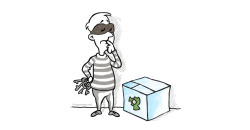

The solution: offsite copies and local file encryption.Ī good, affordable, usable solution to that problem is to store your client files in “the cloud” and use a software program to seamlessly encrypt your data before it reaches the cloud. These situations could land you in trouble with the ethics board. If your computer is lost, stolen, hacked, or its hard drive breaks, you could completely lose your client files and potentially allow others to view confidential information. If you store your client files on your laptop or desktop, you are not intentionally exposing your client files to others, but this may not provide you the ethics protection you think that it does.


Boxcryptor vs cloudfogger how to#
What constitutes “reasonable care” is really the issue when you choose how to electronically store client files. When you sign-on or hit send on these sites, is there a little voice inside your head wondering whether these platforms are truly safe and whether using them could lead to an ethics violation? There should be, because convenience usually comes with trade-offs, but your law license does not have to be one of them.Īttorneys are required to exercise reasonable care to prevent their vendors from disclosing or using client information, per MRPC 1.6(d). The ease and affordability of online billing, client management, document storage, and payment platforms is a powerful lure.


 0 kommentar(er)
0 kommentar(er)
